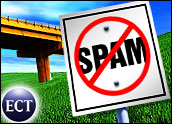
Microsoft has thrown its considerable clout — and its 170 million registered e-mail users — behind a plan that uses preapproved lists of mass marketers in an attempt to curtail the flood of spam.
The company said it has signed on with IronPort Systems’ so-called Bonded Sender program, which enables marketers to become “white listed” and thereby slip past spam filters that otherwise could catch legitimate messages as well as true spam.
The program has been tested over the past five months, Microsoft said, and will be one of many tools used to keep spam away from users of Hotmail and MSN e-mail accounts.
“Our technology arsenal must include a process that works in tandem with our filters to differentiate good e-mail from junk e-mail,” said Ryan Hamlin, general manager of Microsoft’s anti-spam technology and strategy group. The program will help “raise the bar on conduct for good e-mail senders.”
Who Gains?
Microsoft’s backing is seen as a huge boost for San Bruno, California-based IronPort, because the effectiveness of white lists depends on marketers’ willingness to go through the vetting process necessary to be included. The addition of Microsoft’s millions of e-mail users to the program makes it far more likely that legitimate marketers will want to sign up, enabling their opt-in messages to bypass increasingly rigorous spam filters.
Under IronPort’s bonded approach, cleared marketers put up cash bonds that can be defaulted or deducted against if their messages breach standards of conduct for legitimate e-mail marketing.
Although white lists are not seen as a cure-all, they can play a role in helping to curb spam by freeing up spam filters to catch truly unwanted e-mail, according to Forrester Research analyst Jan Sundgren.
“Legitimate e-mail marketers are finding themselves not only lumped in with spam, but sometimes caught in filters and never reaching their destination,” Sundgren told the E-Commerce Times. “Many will be willing to go through the process of getting around that hurdle.”
Leading the Way
Widespread adoption of white lists also would help true spam stand out more starkly as it travels across the Internet, Sundgren added. In addition to backing from Microsoft, the white-list effort got a note from the TRUSTe alliance, which seeks to distinguish legitimate online businesses from those that engage in shady practices.
Sundgren acknowledged, however, that even though the standards in use exceed those in the CAN-SPAM Act, there is still room for consumers and marketers to disagree on what constitutes legitimate messages. “This takes some of the guesswork out, but there’s still gray area,” he said.
Microsoft’s backing of white lists likely will lead other major e-mail services to follow suit, which in turn may attract more marketers. There are potential benefits for Microsoft as well — it may open the door to more marketing agreements that provide commercial access under certain guidelines to e-mail users.
Bigger Toolbox
But the company insisted the tool will be just one of many it will continue to use against spam, including other technological solutions, such as an e-mail identifier system that is still in the works, and continued legal action against suspected spammers.
So far, all those efforts — and similar campaigns by EarthLink, Yahoo and AOL — have done little to reduce the amount of spam sent and received. Observers say even aggressive law-enforcement action, such as the first criminal complaints filed under the CAN-SPAM Act late last month, will have a marginal impact at best.













































Social Media
See all Social Media